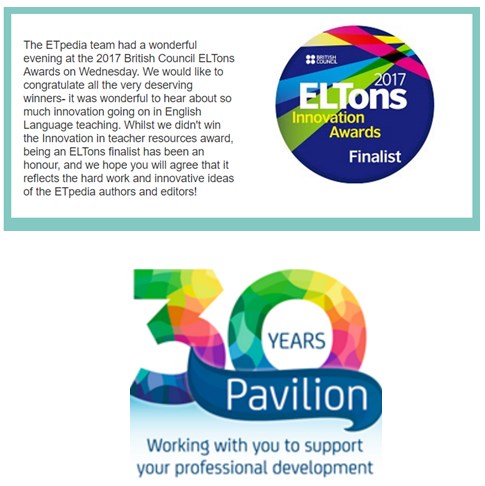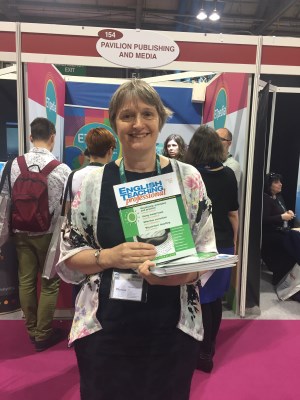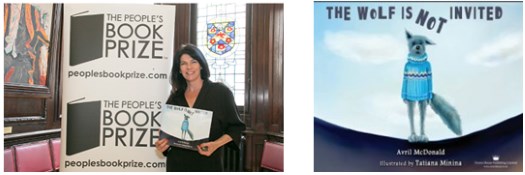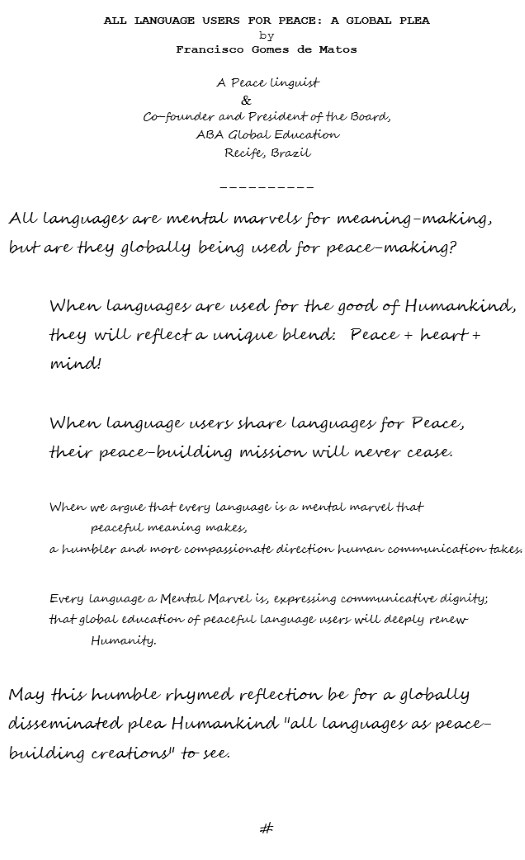Letter 1

Ellie Thackway
Marketing Assistant
Pavilion Publishing and Media
www.pavpub.com/pavpubhome.aspx
Letter 2
Former Cambridge University Press Syndic given
Lifetime Achievement Award
Cambridge University Press would like to congratulate Professor Ronald Carter, until very recently a Press Syndic, member of its Operating Board and chair of its Education and ELT Publishing Committee, on being awarded the 2017 British Council’s 'Lifetime Achievement Award' for his work in ELT and applied linguistics.
The British Council announced Professor Carter as the winner at the annual ELTons awards ceremony in London yesterday (Wednesday, 14 June 2017).The ‘Lifetime Achievement Award’ is given to ELT professionals who have made a substantial contribution to the sector throughout their career. It is supported by ELT teachers and associations as well the British international education publishing industry.
Professor Carter has worked at Nottingham University since 1979 and has been Director of the Centre for English Language Education and Head of the School of English, as well as having a lectureship at the University of Cambridge. He has written, co-authored, edited and co-edited over forty books and over one hundred articles.
After a 10-year research programme with Cambridge University Press involving the development and analysis of huge corpus databases of spoken and written English, Professor Carter co-authored The Cambridge Grammar of English in 2006, which won the 2007 British Council’s ‘English Language Innovation Award’.
Professor Carter has also been involved in a number of knowledge exchange projects with Cambridge University Press, two of them funded by major UK research councils, developing corpus-informed materials for English language, grammar and dictionary development for on-line/mobile learning and a project aligning databases of e-language with the Cambridge English Corpus.
Peter Phillips, Chief Executive at Cambridge University Press, said: ‘Ron has played a critical role in the growth of ELT at the Press over the past 20 years. He has written six important titles for us and has been a central part in ensuring all of our learning materials meet high standards. Ron’s done a huge amount not just for Cambridge but for the industry as a whole and I’d like to extend my heartfelt congratulations to him for this really well-deserved award.’
Letter 3
Dear Hania,
The Visual Arts Circle is a community of practice made up of language teaching professionals with a shared belief in the value of the visual arts in language education. We'd be delighted if you'd like to be a member. Membership is completely free. Here is the mission statement:
The Visual Arts Circle is a community of practice made up of language teaching professionals, teachers, teacher trainers, writers, editors, researchers, designers, illustrators, artists, photographers, and filmmakers, all with a shared belief in the value of visual arts - drawing, painting, sculpture, design, crafts, photography, video, and filmmaking - in language education. We believe that incorporating visual arts is an extremely effective way of improving the quality of teaching and learning, particularly in the field of language teaching. Through the process of sharing information and experiences with the group our members learn from each other, and have an opportunity to develop personally and professionally.
We intend to:
- engage language teachers in practical uses of the visual arts in the language
classroom,
- encourage a dialogue between language teachers in order to share activities and
creative approaches to the use of visual arts in language teaching,
- bring together like-minded professionals so as to build a creative and vibrant
visual arts community,
- open the group to all those committed to its values and objectives beyond the
language teaching community,
- publicise the value of visual arts in language education through articles, books,
conferences and workshops, videos, films, and social media,
- seek cooperation with any recognised organisation which shares our ideas and
values.
We hope to make a difference through:
- involving professionals in multiple fields and at all levels,
- demonstrating the benefits of visual arts in language education with practical
and useful guidance from experts in a variety of fields.
If you're interested in joining, please send a short biodata (maximum 200 words and in third person) and high resolution photo to Magdalena Brzezinska at members@visualartscircle.com and she'll add it to the members' section of our website. We would like to promote our members' projects related to the visual arts, publish articles, lesson plans and books related to the use of the visual arts in language education. You can check out our website here https://visualartscircle.com/
Letter 4
New blog: My Top 10 Highlights of IATEFL Glasgow

Helena Gomm, ETp’s editor-in-chief at the IATEFL exhibition stand
Our blogger Chia says: "IATEFL (International Association of Teachers of English as a Foreign Language) held its 51st conference in Glasgow this year from the 3rd to the 7th April and attracted more than 2000 delegates in what is undoubtedly the largest annual conference for English teachers in this part of the world. I was at the conference with my colleagues from English Teaching professional and these are the top ten highlights of my conference experience."
For more read here
Letter 5
Dear Mrs. Kryszewska,
We have exciting news for everyone who studies or teaches English.
We created an educational board game "LinguaPolis" to help learners practice and reinforce their language skills through speaking.
The game consists of a walk around New York city. The players get in all kinds of situations, which could be solved only by the means of communication.
In order to make LinguaPolis a reality (print and ship it to learners and teachers), we reached for the help of a crowdfunding platform Kickstarter. Check it out here:
www.kickstarter.com/projects/1572133398/linguapolis-language-learning-board-game
We are no longer running a camping with Kickstarter. Instead, we can be found here:
http://linguapolisgame.weebly.com/
Vita Kogan, Language educator & doctoral student in Applied Linguistics
University of Barcelona, Spain, and Stas Kapustin
Letter 6
Dear Hania
I am writing to pitch a feature on how pronunciation teaching has changed over the last 100 years, since the first English Pronouncing Dictionary was published in 1917. Back then, the model of pronunciation was based on ‘Public School Pronunciation.'
Things are thankfully less prescriptivist now, and an estimated 80% of conversation in English occurs between non-native speakers. There is no need (and rarely any desire) to try and try and get learners speaking like the Queen.
I have attached a full press release below with further context, which I hope your readers will find interesting. Our ELT research team are also available for interview – please let me know if you’d like to arrange this.
Best,
Louisa
Whose language is it anyway?
100 years of the English Pronouncing Dictionary
The English Pronouncing Dictionary is 100 years old this year. This classic British guide to pronunciation, originally authored by Daniel Jones in 1917, has long been considered “perhaps the greatest work of the greatest of British phoneticians” (Roach, P., Setter, J. and Esling, J. 2011. Preface. In: Jones, D. Cambridge English Pronouncing Dictionary 18th Edition. Cambridge: Cambridge University Press, iii)
When the ‘standard’ was male and Southern
The original English Pronouncing Dictionary used PSP (Public School Pronunciation) as a model, defined as ‘that most usually heard in everyday speech in the families of Southern English persons whose menfolk have been educated at the great public boarding schools’.Daniel Jones and his peers, such as Henry Sweet, led the way in the study and teaching of pronunciation, and their work has been noted as the inspiration for George Bernard Shaw’s Pygmalion. Jones’s dictionary soon became the ultimate guide for anyone wishing to check the ‘standard’ pronunciation of words, whether English was their mother tongue or a language they were learning.
The changing of attitudes
Attitudes towards pronunciation and accents have changed significantly over the past 100 years. Starting with Wilfred Pickles OBE in the 1940s, even the BBC has gradually introduced regional accents to its line-up of news broadcasters, distancing itself somewhat from the old-fashioned view of PSP or RP (Received Pronunciation) as the voice of broadcasting. Changing attitudes are also related to the growth of English as a global language. In 2008, language expert David Crystal estimated that globally, non-native speakers of English outnumbered native speakers by three to one, and more recent estimates have suggested this could now be as high as six to one.
Nowadays there’s rarely any need, or for most people any desire, to modify accents or the way in which their words are pronounced. And those learning the language can turn to social media for advice on how to understand and be understood in English. For many, YouTube has become the go-to resource, with countless YouTubers dishing out free advice on English grammar, vocabulary and pronunciation. Internet favourites like ‘Korean Billy’ are even teaching the British a thing or two about their own regional accents.
Do we still need an English Pronouncing Dictionary?
Whist recognizing the wealth of online resources that are available to help with pronunciation, Publishing Manager Wendalyn Nichols at Cambridge University Press explains why dictionaries remain of value to language learners:
“When learning a language, it is incredibly useful to have a single, consistent model when developing speaking skills, and clear pronunciation in particular, even if you have no desire to lose your accent. So rather than presenting learners with a model for how they should speak, the English Pronouncing Dictionary simply offers learners a consistent point of reference for how many people do speak. Its purpose is descriptive, not prescriptive. The accents described in the dictionary are two widely-recognised standard accents of English that can be described as broadcast English for the British pronunciations, and ‘standard’ American broadcast English for the US pronunciations.
Importantly, authoritative dictionaries like this also provide a trusted resource for learners who may otherwise struggle to make sense of the conflicting advice on the Web, which can often be inaccurate or biased toward the speaker’s own accent.”
Cambridge University Press took over the publishing of the English Pronouncing Dictionary in 1991. In addition to the classic print version, it is now also available as a mobile app for Android and iOS. Perfect for anyone wanting an instant, trustworthy guide to pronunciation in their pocket, and no doubt something that the pioneering Daniel Jones, and perhaps even Professor Higgins, would have approved of.
Letter 7

We are thrilled to announce that ‘The Wolf is Not Invited’, part of Avril McDonald's Feel Brave series, has won The People's Book Prize Children's Award 2016/17
Avril McDonald had her first panic attack at the age of eight. That attack marked the beginning of Avril learning to live with anxiety disorders and it gave her an insatiable curiosity about the mind–body connection. After a successful career in the digital entertainment industry, Avril returned to her passion for writing and is determined to harness it to help young children cope with the issues most of them will face while growing up. “I want to try and equip children with the tools they need to do this and I’m putting all of my faith in a little brave wolf with a big heart to make it happen.”
- Avril McDonald
From this passion came The Feel Brave series – little stories about big feelings. This series is a collection of beautifully illustrated children’s picture books designed to help children explore emotional intelligence, positive psychology and some of the real-life issues which they might face in an engaging, creative and non-threatening way.
It is such a pleasure to see Avril's work rewarded with this accolade. The People's Book Prize is a unique literary competition judged by the nation and it is the people who have read and loved this story who have awarded it this prize.
Through the Feel Brave series, Avril and her colourful, lovable characters help children learn to manage their emotions and feel brave. Our world has never needed more compassion, creative innovation and positive action to build a better future.
The Wolf is Not Invited by Avril McDonald
Published by Crown House Publishing Limited, ISBN 9781785830174
Category 4 to 7 year olds. Autumn 2016 (Sept - Nov)
Synopsis: Wolfgang is left heartbroken when his best friend Catreen runs off without him to play with Clarissa. Spider shows Wolfgang how to make his own fun and Wolfgang realises that there are other great friends out there just waiting to be met! There are some situations and feelings that we cannot change and there are some that we can. Knowing the difference between the two (and some ways to make ourselves feel happy) is a great trick to have up our sleeves!
Reviews
www.peoplesbookprize.com/book.php?id=1439
www.peoplesbookprize.com/winners2016.htm
Letter 8




|